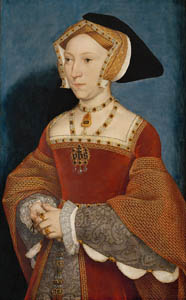On This Day: Death of Jane Seymour
Posted on
On this day in 1537 Henry VIII's third wife, Jane Seymour, died at Hampton Court Palace. Twelve days earlier she had done what her predecessor, Anne Boleyn, had failed to do - give birth to a living baby boy. Sadly though the birth would end up killing her.
Childhood
Jane's exact date of birth isn't known, but she is believed to have been born some time in 1508, mostly likely at her family's home of Wulfhall in Wiltshire. She was one of nine children, of whom six survived, including three of her brothers. Very little is known about her childhood however, her father was Sir John Seymour, but he wasn't a great political player like Anne Boleyn's uncle, the Duke of Norfolk. Unlike Catherine and Anne, she didn't have a reputation for being well-educated or quick witted, which suggests that she may have been taught little more than reading and writing.
But even with little education, Jane could still attend court. Since her father was a courtier it was natural that a place would also be found for her. She was duly assigned to the household of Catherine of Aragon, and on her downfall, to that of Anne Boleyn. During this time she came to the attention of King Henry himself, who by this point was becoming convinced that his second marriage wasn't going to give him the necessary son, just like the first. Jane wasn't considered to be particularly beautiful, and with her lack of education she wasn't going to be the centre of attention like Anne had been. In fact, that was just what Henry appears to have wanted, a quiet and mild wife.
Marriage
Jane and Henry were betrothed on 20th May 1536, the day after Anne Boleyn's execution. They were privately married ten days later at the Palace of Whitehall, but Jane wasn't crowned. Historians believe that Henry decided to wait until Jane was pregnant before she was officially given the crown, coronations were large, public and expensive events and he would hardly go to the trouble for a woman that may prove to disappoint him.
Unlike Catherine in her early days, and Anne during the height of her success, Jane appears to have had little to no power or influence over the King. Several times she appealed for mercy, first for Princess Mary and then later on behalf of an Abbey and for the lives of men involved in a northern rebellion. Henry consistently refused her requests, and at one point reportedly told her to keep Anne in mind, which can't be seen as anything less than a threat. On the other hand Jane was allowed to order her women as she liked, and apparantly banned her ladies from sporting the French fashions which had been so popular under Anne.
Death
By the spring of 1537 Jane was pregnant. The summer progress - a tour of various counties by the King and Queen so they could get away from sickness in London - was cancelled. After so many miscarriages with the previous Queens, nothing was left to chance with this pregnancy, there would be no travelling if it could be avoided. Jane went in to "confinement" at Hampton Court on 16th September. She went in to labour in the second week of October. It would prove to be a long ordeal, reports from the time suggest it took three days for things to progress, and prayers and hymns were sung for her health. On 12th October, a live baby boy was finally born, and was promptly named Edward. After his christening, three days later, he was returned to Jane's room where she and Henry were waiting to receive the court.
At first it seemed that Jane had got through her ordeal safely, she was certainly well enough to receive the court in her room. But she soon took a turn for the worst. Despite more prayers in St Paul's Cathedral, and the best attempts of her doctors, she died on 24th October 1537. Her cause of death was most likely puerperal fever, a serious infection that was common in a time when no one understood the concept of hygiene, such as midwives washing their hands.
She was buried at Windsor Castle in St George's Chapel, and Henry would eventually be buried beside her. Jane's death sealed her in Henry's memory as his perfect wife. She had given her life so that he could have the heir he wanted.
(If you're a fan of Jane Seymour, you can also check out her badge!)